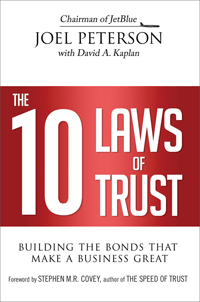Trust is the foundation of all relationships and business transactions. Without trust, it’s tough going. Without trust we must guard, monitor and protect. This takes time, is stressful and gets expensive. Trust is based on reciprocity in our personal and professional life. We are fortunate when we have it and know it. But once betrayed, it changes our thinking and relationships with those who are no longer trustworthy.

Most of us can feel who we trust, but may not be able to state why we trust that person. Peterson helps by building the structure of trust for us. Well-grounded trust requires and depends on three conditions which are: character, competence and authority. Character: We trust if those we deal with value our interests as their own. Competence: We trust those that have the intelligence, ability and training to achieve our interest. Authority: We trust those that are empowered to deliver what they promise.
I can mentally scan personal and professional situations such as trusting someone to drive me in their car, eat their food, repair my car or purchase a high-priced item from. All, in various degrees, require trust, yet we all know the danger signals of a lack of trust in these situations. Trust is both intuitive and rational.
We learn that of the three types of trust only two have real value. The best trust is reciprocal and is based on mutual respect. This can be found in families, good friendships, high-performance teams and business associations that share values and goals. The second trust is representative and has a power relationship where one is subordinate yet the trust is genuine and positive, such as child to parent, boss to employee or respectful political representation. The least preferred trust is the marginalized pseudo-trust, which may be faked for an occasion and is short-term and unreliable in the long-term.
Once the basics are outlined, the book moves to the 10 laws of trust and explains each in a succinct easy to read chapter. The 10 Laws include: 1. Personal integrity, 2. Investing in respect, 3. Empowering others, 4. Measuring what to achieve, 5. Creating common dreams, 6. Keeping everyone informed, 7. Embracing respectful conflict, 8. Showing humility, 9. Striving for win-win negotiations, 10. Proceeding with care to restore trust.
I recommend this book for personal reflection as well as to assess others we trust. Trust means relinquishing control to others. It is a serious business for both personal and professional well- being.
Lucia Worthington is at home in her garden this summer and celebrates both personal and professional trustworthy people in her life. To recommend a book for review, email bookreviews@vbjusa.com.